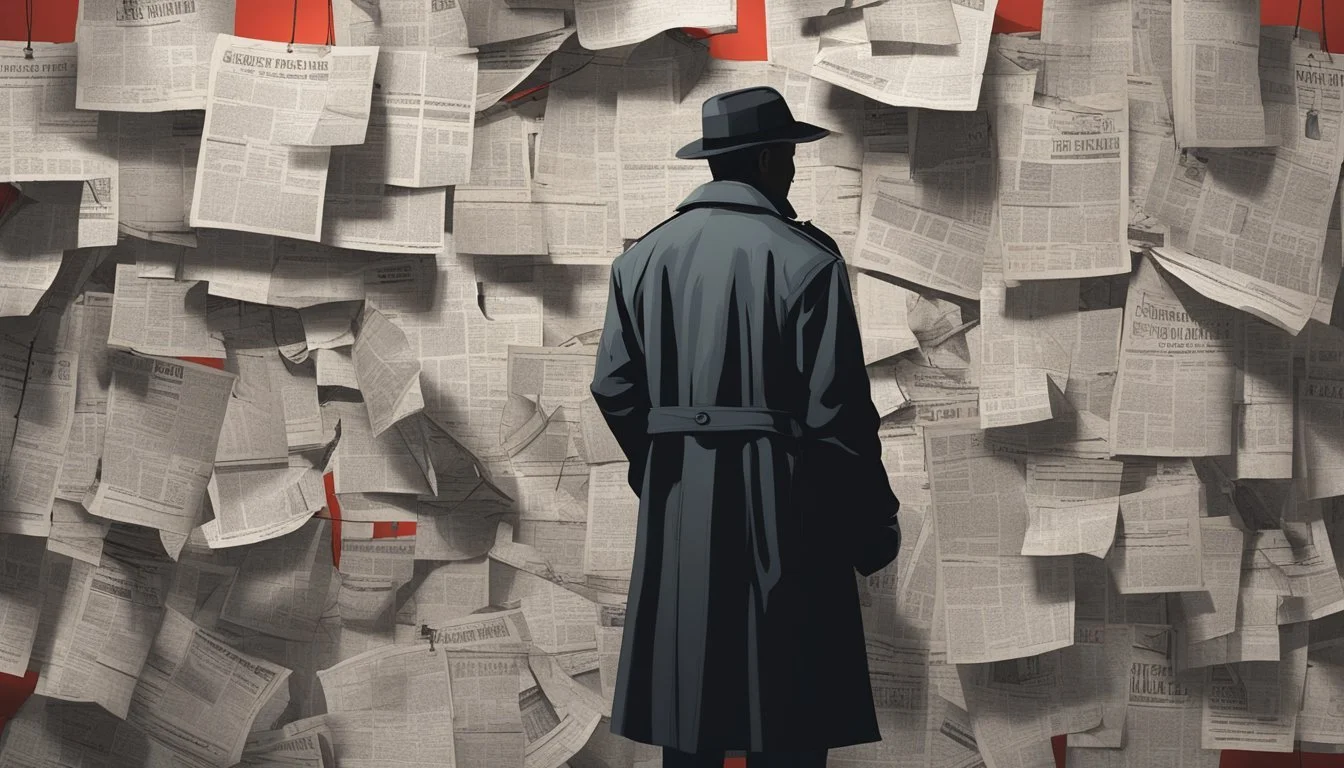Unmasking the CIA: The Real Agent Behind Fair Game
Revelations from Declassified Documents
Valerie Plame Wilson emerged as a central figure in a political controversy that rocked Washington in the early 2000s. A former CIA covert operations officer, Plame's identity was leaked to the press in 2003, effectively ending her career in intelligence. Her story gained widespread attention and was later adapted into the film "Fair Game," starring Naomi Watts as Plame.
Born in 1963 on Elmendorf Air Force Base in Alaska, Plame's background prepared her for a life of service. She earned degrees from prestigious institutions including Pennsylvania State University and the London School of Economics. Her expertise and training made her a valuable asset to the CIA, where she worked on critical issues related to weapons of mass destruction.
The unmasking of Plame's identity as a CIA operative sparked intense debate about government transparency, national security, and the ethics of political maneuvering. After leaving the CIA, Plame relocated to Santa Fe, New Mexico with her husband and children. She has since pursued writing, including work on a spy novel, drawing from her unique experiences in the world of covert operations.
The Valerie Plame Affair: Context and Controversy
In 2003, Valerie Plame's covert CIA identity was exposed, igniting a political firestorm. Plame had served as a non-official cover (NOC) officer, one of the most sensitive positions within the agency.
The controversy began when her husband, former Ambassador Joseph Wilson, publicly criticized the Bush administration's justification for the Iraq War. Wilson had investigated claims about Iraq seeking uranium from Niger and found them to be unfounded.
Shortly after Wilson's critique, conservative columnist Robert Novak revealed Plame's CIA status in a newspaper article. This disclosure was allegedly orchestrated by senior White House officials as retaliation against Wilson.
The leak of Plame's identity had serious consequences:
Compromised ongoing intelligence operations
Endangered Plame's contacts and sources
Ended Plame's CIA career
Sparked a federal investigation
The incident raised questions about the intersection of politics and national security. It highlighted the potential misuse of classified information for political purposes and the vulnerability of covert operatives.
Plame later wrote a memoir titled "Fair Game: My Life as a Spy, My Betrayal by the White House," detailing her experiences. The book provided an insider's perspective on the affair and its aftermath, though portions were redacted due to ongoing classification.
Central Intelligence Agency: Role and Operations
The CIA plays a crucial role in national security through intelligence gathering and covert operations. It operates globally to collect and analyze information critical to US interests. The agency's work has shaped major historical events since its founding in 1947.
The CIA's Mission and Objectives
The CIA's primary mission is to collect, analyze, evaluate, and disseminate foreign intelligence to assist the President and senior US government policymakers in making decisions relating to national security. Key objectives include:
• Warning leaders of potential threats • Providing intelligence on foreign countries and organizations • Conducting covert operations as authorized by the President
The agency aims to be the premier source of intelligence on global issues. It focuses on challenges like terrorism, weapons proliferation, cybersecurity, and geopolitical developments that could impact US interests.
Covert Operations and Intelligence Gathering
CIA covert operations involve secret missions to influence political, economic, or military conditions abroad. These can include:
• Propaganda campaigns • Support for foreign political groups • Paramilitary operations
Intelligence gathering utilizes both human sources (HUMINT) and technical methods (SIGINT, IMINT). The CIA employs case officers to recruit and handle foreign agents who provide classified information.
Technological tools like satellite imagery, communications interception, and cyber operations also play a major role in modern intelligence collection efforts.
Historical Milestones in CIA Operations
1961: Bay of Pigs invasion - Failed CIA-backed attempt to overthrow Fidel Castro in Cuba
1975: Church Committee investigations reveal CIA abuses, leading to reforms
1985: CIA officer Aldrich Ames arrested for spying for Soviet Union
2001: CIA leads initial US operations in Afghanistan after 9/11 attacks
2011: CIA provides intelligence supporting operation to kill Osama bin Laden
These events highlight the CIA's involvement in major foreign policy initiatives and national security crises throughout its history. The agency continues to adapt to evolving global threats and technological changes.
Fair Game: The Book and Movie Rendition
Valerie Plame Wilson's memoir "Fair Game" and its subsequent film adaptation brought her story of CIA service and political scandal to a wide audience. The book and movie offer differing perspectives on the events surrounding Plame's exposed identity as a covert CIA operative.
Valerie Plame's Memoir
Valerie Plame Wilson published "Fair Game" in 2007, detailing her experiences as a CIA officer and the aftermath of her identity's exposure. The memoir provides a firsthand account of her covert work and the personal toll of the political controversy.
Plame's book faced significant redactions from the CIA, with many details of her service deemed classified. To fill in the gaps, national security reporter Laura Rozen contributed an afterword providing context to Plame's narrative.
The memoir serves as a historic record of the consequences Plame faced for speaking out against government actions. It offers readers insight into the inner workings of the CIA and the personal impact of political retaliation.
Adaptation into Film
Director Doug Liman adapted "Fair Game" into a film in 2010, starring Naomi Watts as Valerie Plame and Sean Penn as Joseph Wilson. The movie combines elements from Plame's memoir and Wilson's book "The Politics of Truth."
The film dramatizes the events leading to Plame's exposed identity and the subsequent fallout. It focuses on the couple's personal struggle and their fight against powerful government figures.
Liman's adaptation aims to make the complex political scandal accessible to a broader audience. The movie highlights the tension between national security, personal integrity, and political maneuvering.
Public and Critical Reception
"Fair Game" in both book and film format garnered significant attention. The memoir provided readers with a rare glimpse into the life of a CIA operative and the political machinations in Washington.
Critics praised Plame's candor in the book, though some noted the limitations imposed by CIA redactions. The film received mixed reviews, with praise for the performances of Watts and Penn.
Some viewers found the movie's portrayal of events compelling and informative. Others criticized it for potential bias or oversimplification of complex issues. Despite differing opinions, both the book and film sparked public discourse on government accountability and the treatment of whistleblowers.
Unveiled Realities: Unpacking the 'Fair Game' Narrative
The film "Fair Game" brought Valerie Plame's story to the big screen, portraying the events surrounding her exposed CIA identity. This adaptation raised questions about accuracy and the broader implications of the scandal.
Fact vs. Fiction in 'Fair Game'
"Fair Game" dramatizes Valerie Plame's experiences as a CIA officer and the fallout from her outed identity. The movie, starring Naomi Watts as Plame, aims to capture the essence of the real-life events.
While based on true events, the film takes some creative liberties. It condenses timelines and simplifies complex political situations for narrative purposes.
The core facts remain intact: Plame's identity was leaked, and her career as a covert agent ended abruptly. The film accurately portrays the personal toll on Plame and her family.
However, some details are embellished or altered. The movie heightens dramatic tension in certain scenes, potentially overstating the immediate danger to Plame and her contacts.
Legal and Ethical Implications
The Plame affair raised serious questions about government accountability and the protection of intelligence operatives. Leaking a CIA officer's identity is illegal under the Intelligence Identities Protection Act.
The scandal led to a criminal investigation, resulting in the conviction of I. Lewis "Scooter" Libby for perjury and obstruction of justice. This outcome highlighted the legal consequences of compromising national security.
Ethically, the case sparked debate about the appropriate balance between government transparency and safeguarding sensitive information. It underscored the potential consequences of using classified information for political purposes.
The incident also brought attention to the risks faced by covert operatives and their families when their identities are exposed. It emphasized the need for stronger protections for intelligence personnel.
Media Influence on Intelligence Discourse
The media played a pivotal role in shaping public discourse around intelligence matters during the Valerie Plame affair. Press coverage and journalistic choices significantly impacted how the public perceived the CIA and its operations.
Press Coverage of the CIA Leak
Major news outlets extensively covered the CIA leak scandal. The Washington Post and New York Times published numerous front-page stories, detailing the unfolding events. Television networks aired frequent reports and analysis segments.
Many journalists faced ethical dilemmas about publishing classified information. Some defended their actions as serving the public interest, while others were criticized for potentially compromising national security.
The media's framing of the story evolved over time. Initial reports focused on the leak itself, but coverage later shifted to broader questions about intelligence gathering and political motivations.
The Media's Role in Shaping Public Perception
News coverage significantly influenced public opinion on intelligence agencies and government transparency. Polling data showed fluctuations in trust towards the CIA and White House as new information emerged.
Media outlets often simplified complex intelligence matters for mass consumption. This sometimes led to misunderstandings about covert operations and the role of intelligence officers.
Pundits and commentators played a key role in interpreting events for viewers. Their analyses often diverged along partisan lines, contributing to polarized public reactions.
Social media platforms began to emerge as alternative sources of information and debate. Online discussions sometimes spread unverified claims, challenging traditional media narratives.
Aftermath of the Exposure
The exposure of Valerie Plame's CIA identity had far-reaching consequences for her career, colleagues, and U.S. intelligence operations. It also sparked policy changes and legal actions aimed at preventing similar incidents in the future.
Impact on Valerie Plame and Colleagues
Valerie Plame's covert CIA career came to an abrupt end following her exposure. She resigned from the agency in 2005, unable to continue her undercover work. The revelation compromised her network of contacts and ongoing operations, potentially endangering assets and informants worldwide.
Plame's colleagues faced increased scrutiny and suspicion. Some of her former contacts became hesitant to work with U.S. intelligence, fearing their own identities might be compromised. The incident created a chilling effect within the intelligence community, making it more challenging to recruit and maintain valuable sources.
Policy Changes and Legal Repercussions
The Plame affair led to stricter protocols for handling classified information within government agencies. The CIA implemented more rigorous measures to protect the identities of covert operatives. Congress passed the Intelligence Identities Protection Act, strengthening penalties for intentionally disclosing the identities of covert agents.
Legal actions followed the exposure. Special Prosecutor Patrick Fitzgerald conducted a thorough investigation into the leak. This resulted in the conviction of I. Lewis "Scooter" Libby, Vice President Dick Cheney's chief of staff, for perjury and obstruction of justice. However, President George W. Bush later commuted Libby's prison sentence.
The Broader Implications for National Security
The Valerie Plame Wilson case raised serious questions about the protection of covert operatives and classified information. By exposing a CIA agent's identity, national security was potentially compromised.
This incident highlighted vulnerabilities in safeguarding sensitive intelligence. It demonstrated how easily classified information could be leaked, even at the highest levels of government.
The fallout impacted CIA operations and human intelligence gathering. Revealing a covert agent's identity put other operatives and sources at risk, potentially damaging ongoing missions and relationships with foreign contacts.
Trust between intelligence agencies and the government was strained. The politicization of intelligence raised concerns about the independence and integrity of the CIA and other agencies.
The case underscored the delicate balance between transparency and secrecy in a democracy. It sparked debate on the limits of executive power and the role of whistleblowers in exposing potential abuses.
Legislation to better protect covert operatives gained traction. The Intelligence Identities Protection Act was strengthened to impose harsher penalties for deliberately exposing undercover agents.
Intelligence agencies reviewed and enhanced their protocols for protecting classified information. New safeguards were implemented to prevent unauthorized disclosures and better secure sensitive data.
The incident served as a wake-up call, prompting a reassessment of information sharing practices between government bodies and the media. It highlighted the need for clearer guidelines on handling classified material.
CIA in Popular Culture and Its Effects on Transparency
The CIA has long captured the public imagination, featuring prominently in books, films, and television shows. This widespread portrayal has both positive and negative implications for the agency's transparency.
Popular media often depicts CIA agents as suave, highly skilled operatives engaged in high-stakes missions. These portrayals can romanticize the agency's work and potentially obscure its real-world activities and challenges.
Some works, like Valerie Plame Wilson's "Fair Game," offer more nuanced insights into CIA operations. Wilson's memoir, which underwent CIA redaction before publication, sheds light on the complex relationship between the agency and public disclosure.
The CIA's presence in popular culture has increased public interest in its activities. This heightened scrutiny can lead to calls for greater transparency and accountability from the agency.
Media portrayals can also shape public perception of the CIA's role and capabilities. Accurate representations may educate the public, while inaccurate ones can create misconceptions about the agency's functions and limitations.
The agency's efforts to control its image through media interactions and selective information release further complicate the relationship between popular culture and transparency. This dynamic creates an ongoing tension between public fascination and the need for operational secrecy.
Conclusion
Valerie Plame Wilson's story sheds light on the complex world of CIA operations and political intrigue. Her career as a covert agent came to an abrupt end due to controversial circumstances.
The film "Fair Game" brought wider attention to Plame's experiences. It dramatized the events surrounding her identity exposure and its aftermath.
While the movie took some creative liberties, it highlighted important issues of government accountability and the dangers faced by intelligence operatives. Plame's case sparked debates about the balance between national security and transparency.
The incident left a lasting impact on U.S. politics and intelligence practices. It underscored the potential consequences of mixing intelligence work with political motivations.
Plame's story continues to resonate as a cautionary tale about the vulnerabilities of covert operatives. It serves as a reminder of the risks and sacrifices made by those in the intelligence community.







